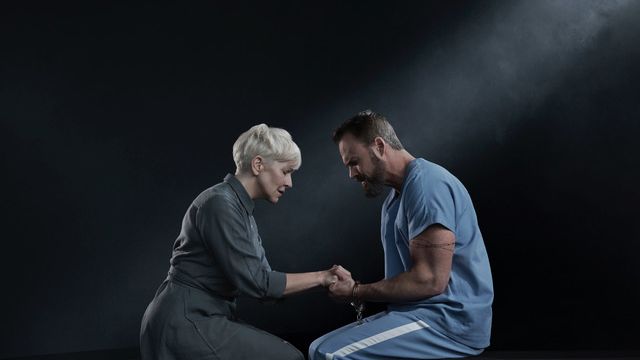Dead Man Walking
In 1993, Sister Helen Prejean’s memoir Dead Man Walking launched her on the national stage and inspired the 1995 Oscar-winning movie of the same name starring Susan Sarandon and Sean Penn.
Dead Man Walking is the latest release on the Metropolitan Opera, Live HD series. American composer Jake Heggie’s masterpiece, it is the most widely performed new opera of the last 20 years, and now a powerful new production by Ivo van Hove.
Based on Sister Helen Prejean’s memoir about her fight for the soul of a condemned murderer, Dead Man Walking is the combination of Heggie’s haunting and poignant music and a meaty libretto by Terrence McNally. A sung version of the opera will be performed in New York State’s Sing-Sing prison with inmates from the music program as the chorus.
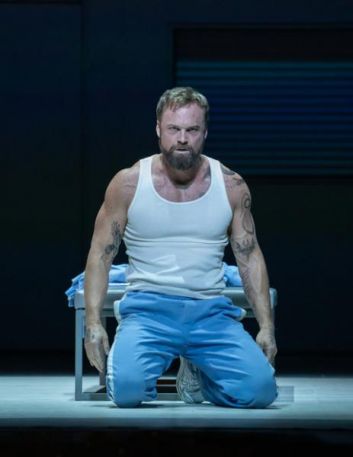
The opera raises questions about how as a society we respond to violence on a human level. All involved parties are suffering. Human dignity is not being respected, no one is being cared for in a humane way. The justice meted out by the American prison system is no less violent or worse than the crime. Despite how legally correct that may be, it still feels totally wrong.
“I will be the face of love for you, I will be the face of Christ for you,” says Sister Helen to Joseph just before his execution. Sister Helen remains as close as possible as Joseph is surrounded by prisoners, officers, and the deceased's families, strapped to the crucifixion-like medical bed and prepared to be put to death.
Director Ivo van Hove tackles the meaty issues and moral dilemmas of this opera with razor -like focus. The movement is kept to a minimum without resorting to ‘stand and sing’ focussing our attention on the singing and yes, the acting. It is the acting skills of the performers that make this production memorable.
Jan Versweyveld’s set is spare, minimalist and focuses on the main protagonists -grey, expansive walls, minimal props, and a small room behind a door at the back remain throughout. Any of the conceptual elements of the staging are put aside however for the agonising and silent focus on the details of De Rocher’s execution: the insertion of the needle, the pumping of the green poison, the long flatlining beep of the ECG — the only thing recognisable as music as white light floods the stage.
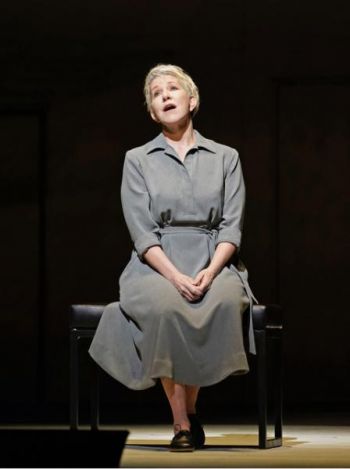
Esteemed Met Music Director Yannick Nézet-Séguin brings Heggie’s music to life. There are nods to American folk song, Gershwin-like melodies and gritty nods to Philip Glass and Alban Berg while still retaining the unmistakable Heggie style.
Two-toned lighting (by Versweyveld and projections by Christopher Ash) is a feature of the opera, defining Sister Helen and Joseph De Rocher’s worlds, combined with their faces projected large onto the screen as the day of Joseph’s death approaches. A crew of camera operators appear onstage to feed close-ups of the singers to a massive cubic screen suspended over the stage like something out of 1984.
An D’Huys costumes are deliberately monotonal and subdued in colour, presumably to add to the desolation of the various acting areas.
Mezzo-soprano Joyce DiDonato stars as Sister Helen. Her uniquely warm, pure voice makes her the ideal choice. It is richly nuanced, and her expressions of faith clear and believable — particularly in the hymn He Will Gather Us Around, used as a motive at the beginning and the end of the opera. DiDonato gives a bravura performance in an uncompromising, exhausting role.
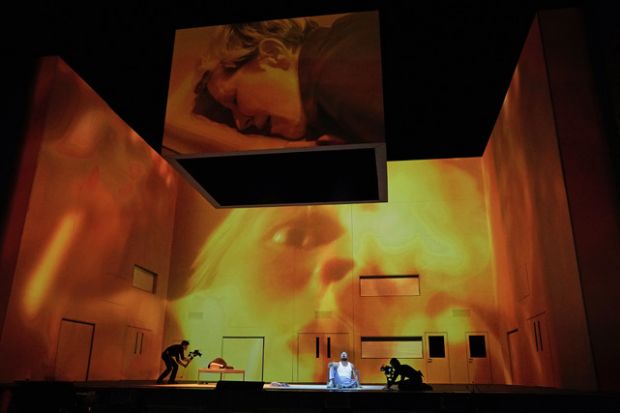
The exceptional cast also features bass-baritone Ryan McKinny as the death-row inmate Joseph De Rocher whose thirst and demand for life are skilfully fully captured by McKinny’s tenderness and strength of tone, which becomes unsettling to witness. It is his inner strength that leads Sister Helen to fight for him. At the centre of his rage is his humanity; he balances robust singing, undermined by a helplessness of frailty and mounting fear. His confession scene is perfection!
Mr. McKinney became a pen pal to a death row inmate in Texas, who sadly committed suicide after the Supreme Court refused to hear his appeal last year.
My favourite supporting performance of the evening comes from mezzo-soprano Susan Graham, who sang Joe’s mother — billed as Mrs. Patrick De Rocher. Twenty-three years ago, Graham created the role of Sister Helen at San Francisco Opera’s premiere of the opera. She gives a practically flawless performance of the grief-stricken mother. Everything is mastered, her style and the clutching of her handbag, to her heartbreakingly address to the pardon committee.
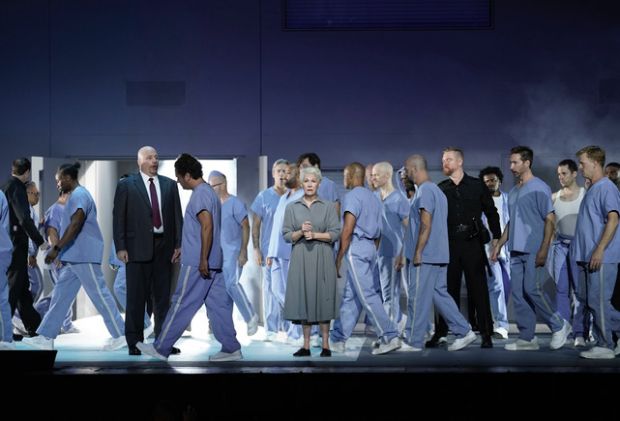
Soprano Latonia Moore as Sister Rose gives a moving performance in her support for Sister Helen.
The chorus form the guards, the public at De Rocher’s trial and witnesses at the execution.
Dead Man Walking is a thought-provoking Opera about truth, forgiveness, and the possibility of redemption. The fact that it based on truth makes it even more compelling. Ms. DiDonato goes so far as to call it “the greatest love story in the opera world!”
Barry Hill OAM
Subscribe to our E-Newsletter, buy our latest print edition or find a Performing Arts book at Book Nook.

